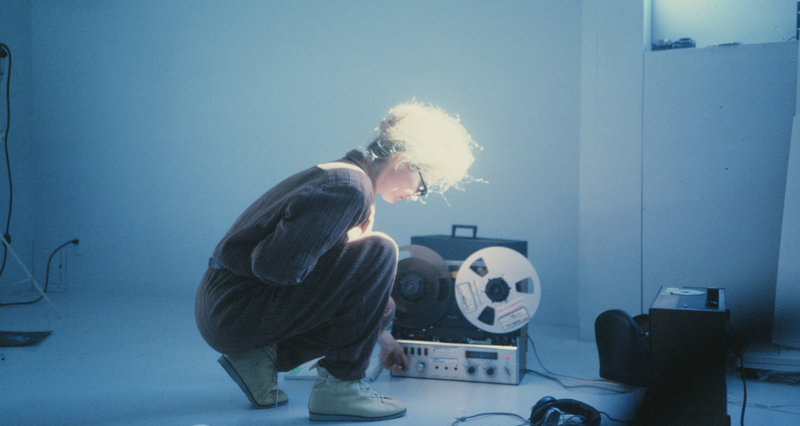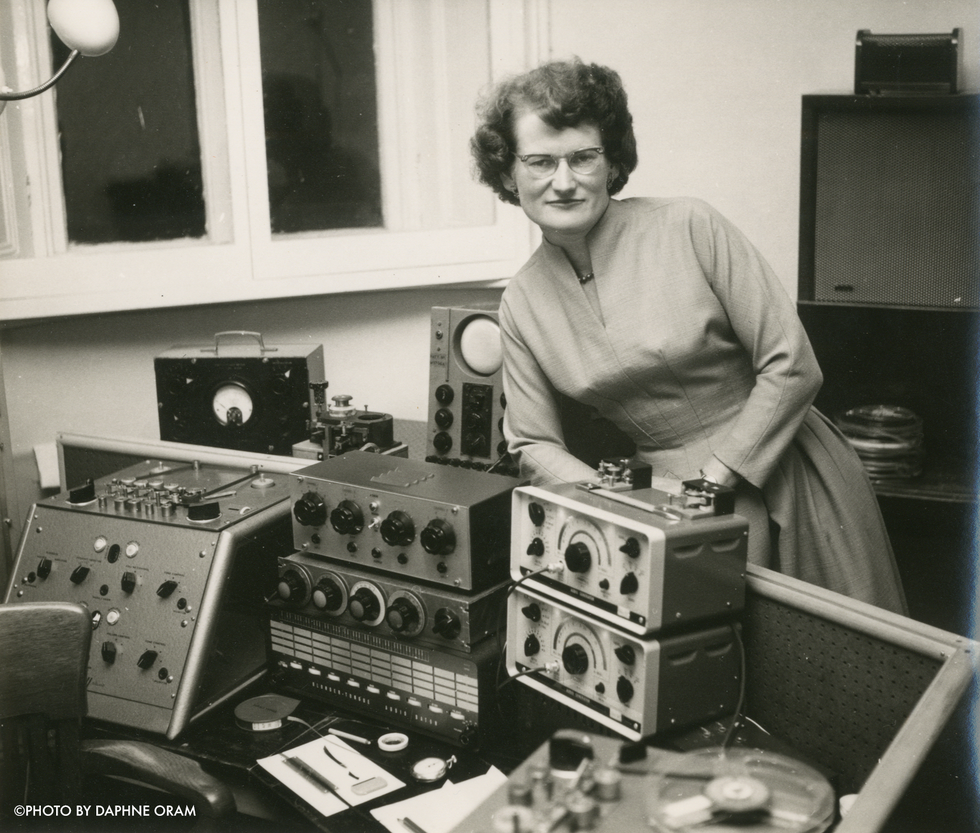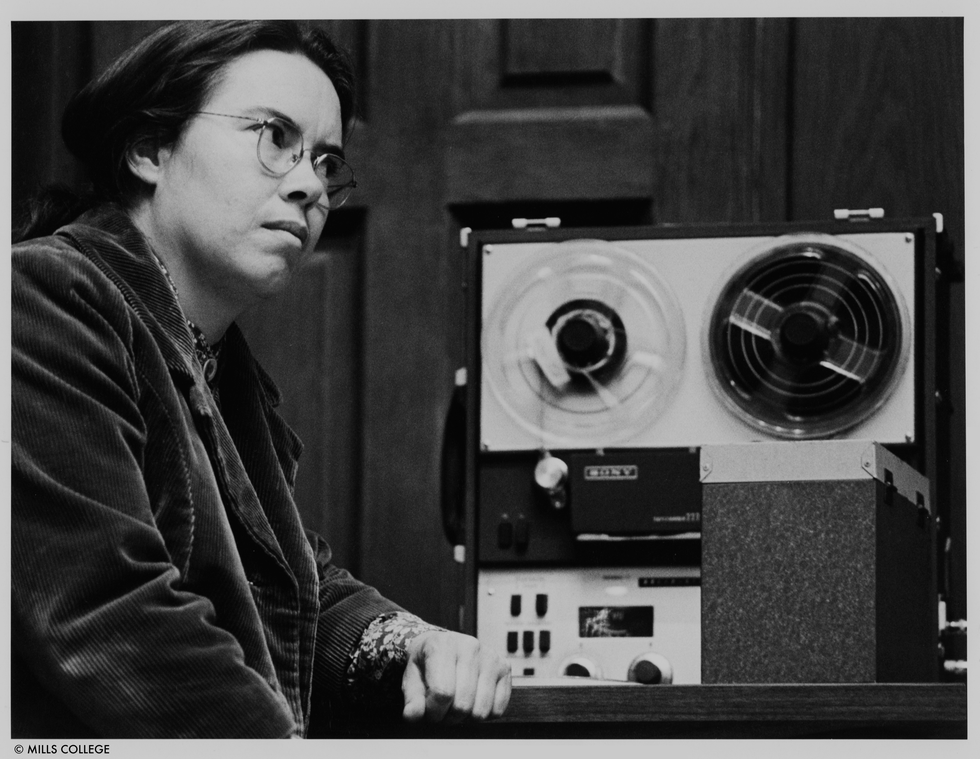When we think of pioneers in electronic music, who comes to mind?
Perhaps Brian Eno, with his professorial vibes and conceptual strategies. Or Kraftwerk, with their avant-garde robot pop and future-obsessed lyrics. Or maybe, Nils Frahm or another contemporary-classical boffin, squirrelling away behind vintage synths and wowing concert halls with their unconventional way with a grand piano.
Whoever it is, the person you’ve thought of is almost certainly male.
Now a new documentary aims to give voice to “electronic music’s unsung heroines”. Sisters With Transistors, by French-American first-time director Lisa Rovner and narrated by Laurie Anderson, maps out a revisionist history of machine music focusing on female pioneers, twiddling away behind early synthesisers and creating otherworldly soundtracks, often armed with little more than magnetic tape, scissors and a lot of patience.
Rovner’s story begins in the Thirties with Clara Rockmore, the Lithuanian violin virtuoso and early champion of the theremin. Other featured artists include Daphne Oram (co-founder of the BBC Radiophonic Workshop and pioneer of musique concrète), Bebe Barron (who co-wrote the first entirely electronic film score, for 1956’s Forbidden Planet), Pauline Oliveros (who founded the San Francisco Tape Music Centre in the 1960s) and Éliane Radigue (French drone synth pioneer).
Perhaps the best-known name is Delia Derbyshire, the composer whose pioneering work during the Sixties with the BBC Radiophonic Workshop left us with the indelible gift of the Doctor Who theme music – adopted by The KLF, Orbital and Pink Floyd to name three (all men).
Rovner’s film is comprised entirely of archive footage and uses its subjects’ own words in voiceover. As much a commentary on the broader social and political forces of the 20th Century as an exercise in showcasing formidable-looking characters in front of walls of primitive machinery – though it’s that too – Sisters with Transistors makes its case enjoyably and convincingly, and will send you down a rabbit hole of discovery.
Presumably the biggest challenge in making this film was finding the footage.
It took years to uncover all that material. Then, of course, the biggest challenge was figuring out how we were going to pay for it all. The film started with a grant application and then we hired an archivist and realised quite quickly that the material was going to be difficult to uncover. So I took on the challenge and did most of the archive research myself. Originally we had hoped we would get a TV commission which would have made the funding process a lot easier. But if it had been on TV, we’d have had to deliver it quite quickly, so I don’t think we would have found all the material that we did. Some of the footage was found through old lovers and it was a little bit of detective work. It was a long process.
How did you settle on the format?
I really wanted to make something that reflected the radical nature of the subject. It didn’t make sense to put a traditional talking head documentary style to what is some of the most radical music ever made. From the beginning I imagined the film as a kind of oral history, illustrated. So many of women’s histories are a history of silence. It was really important to me that the film give voice to these women that, for the most part, have been absent from the historical canon of electronic music.
You’ve managed to knit together quite a disparate cast of characters.
It was amazing discovering how many of these women were women with agency and how truly independent they were. They were just completely brilliant in every way. I was completely mesmerised and inspired by them. These women were pushing boundaries, not only musically and sonically but also intellectually, in so many interesting ways. I just fell in love with all of them.
One of the most memorable is Clara Rockmore, the Lithuanian violin virtuoso who helped design the theremin – and then toured concert halls playing it.
Absolutely. The playing is just remarkable. I love to imagine what it must have been like in 1934, in the concert that appears in the film. I just can’t imagine what people must have been thinking to see this incredible beauty... playing the air, basically.
What was your entry into this world?
I discovered Delia Derbyshire a few years back through Jarvis Cocker’s radio show [Jarvis Cocker’s Sunday Service on BBC Radio 6 Music]. But what I think really intrigued me about this subject was that this was the sound of a kind of liberation. And when I think about my own personal liberation it definitely came about when I was dancing at raves, so there was definitely that parallel.
You explain that Delia Derbyshire’s Doctor Who theme music took 40 days to make. Using tape and scissors.
I know! She had the dedication, and the concentration.
How important was the BBC Radiophonic Workshop?
The BBC Radiophonic Workshop [came into being] just after World War II. Tape came in because of the war’s needs for better communication. That communication was done using radios. So that was how all these women got their jobs, because the men were fighting at war. I didn’t realise how linked electronic music was to war. The fact those radios existed. And, you know, computers. There’s a woman called Tara Rodgers who has written many books about women and electronic music and she talks about how even the words that are used, ‘attack’, ‘delay’ are from war – it’s very interesting.
One of your arguments is that women turned to electronic music because they’d already been excluded from other genres, by the male-dominated establishment.
Yeah, absolutely. One of the questions that often comes my way is: ‘Is there such a thing as a feminist sound?’ And I guess I always think ‘no’ because when you think about the output of these women it’s so different and so idiosyncratic. But, then, thinking about it more, there is a connection there. Because so much of it is about listening and ultimately I think that is very female. I’m totally stereotyping and I’m totally happy for people not to ride with this thought. But the fact that so much of this music made by these women is about, or around... listening.
The idea of “deep listening” comes up in the film.
Pauline Oliveros talks about it a lot. It just means ‘listening in an engaged way’. If you think about how most people consume music now, it trends to be just background. But ['deep listening' is] also more philosophical than that. It’s really listening for things that have been left out. So in the film [Oliveros] talks about these sonic meditations that she was doing with this whole group of women who were composers – they were married to men who were also composers – and [so] never had a space to exist. They came together to listen to each other, and the sounds around them.
Another idea that comes across is how scared people were of electronic music as it emerged.
Oh yeah. It’s interesting to think when electronic music really came into its own after the horrors and atrocities of war. So the plays and television programmes that electronic music studios were being asked to score were reflective of that. Those early scores are eerie and surreal and really scary. Although I think [the] Forbidden Planet [score] is quite musical and really beautiful.
The first entirely electronic film score. Even though the the powers that be insisted on the term “electronic tonalities”, not "music".
It’s funny because you can kind of understand the point of view. Rather than be amazed by it, it’s just the way humans work, right? We’re so afraid of difference, of anything new.
It happens every time there’s a new strand of electronic music. “That’s not music!”
I think people are way more open than they were but there’s an interview [in the film] with Éliane Radigue and a radio host and she’s talking about how people don’t consider her music, music. And that interview actually comes from the Eighties.
One of my favourite bits comes in the first 30 seconds. An interview with a female raver, in a field somewhere in England, at dawn.
[Laughs] It was just something that I saw ages ago that was floating around on YouTube. It’s something I’ve always loved and shared with friends. It felt like the right way to bring a younger, more contemporary audience into what is ultimately a very historical film. A way of bridging the two and reminding people: this is really the history of the soundtrack to our lives.
Sisters with Transistors is released on Friday 23 April through Modern Films
Like this article? Sign up to our newsletter to get more articles like this delivered straight to your inbox
Need some positivity right now? Subscribe to Esquire now for a hit of style, fitness, culture and advice from the experts















